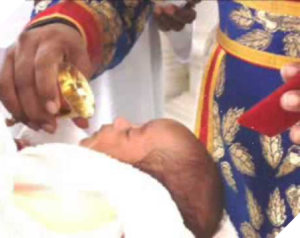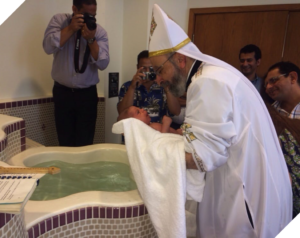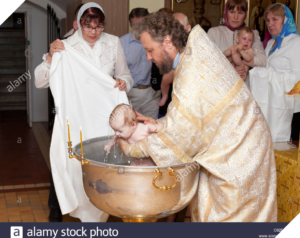Infant Baptism – A Practice of the Early Church

Many orthodox Christians have asked or ask themselves such questions.
- How can infants believe and be baptised?
- Where in the Scriptures does it show, an infant being baptised?
- Should I be baptised again?
Lets us try to answer these and many other questions related to infant baptism?
I. Does the Holy Bible show any example of Infant Baptism? – No.
The Holy Bible does not have a direct single reference to show that the children were baptised. At the same time the Holy Bible does not mention that children of any family remained unbaptised, till they became adults.
- First let us see whether children existed in the early Christian times. [1 Jn. 2: 1, 12, 13, 14, 18] children, fathers, young men.
- There is a mention of five families being baptised in book of Acts & Corinthians.
[a). The whole family of Cornelius believed in Jesus Christ and got baptized by St. Peter. Acts 10: 24, 48.
b). The woman named Lydia, of Thyatira a seller of purple, which worshipped God, heard the word of God from St. Paul, believed in Him and her whole household got baptized by St. Paul. Acts 16: 15.
c). Acts 16: 33-34 Philippian Jailor and his entire family was baptised.
d). Crispus, the leader of the synagogue, believed on the Lord with all his house and many of the Corinthians were baptized. Acts 18: 8. Crispus.
e). 1 Cor. 1: 16 Stephanos]. No mention that only adults were baptised and children were asked to be baptised at a later stage as adults, but the entire family and house hold was baptised. {Household – Gk. Oikos: husband, wife, children, infants and servants. i.e. complete family}

3. The Holy Bible has not mentioned even one example of an alternative baptism of a Christian child as an adult. The bible does not state that every child is in a suspended ‘state of salvation’ until they have reached an age of maturity.
From the beginning of New Testament Christianity at the Feast of Pentecost, to our time, unbroken and uninterrupted; the church has baptized babies. Entire households (Jewish, proselytes and Gentiles) were baptized by Christ’s original 12 and that practice has continued with each generation.
- Mk. 16: 16 is the basis. “Whoever believes and is baptised will be saved, but whoever does not believe will be condemned”.
- Mk. 16: 9-20 in brackets, not in the original text, added later on.
- Compare Mk. 16: 14-19 with Mt. 28: 16-20. {Baptise first and then teach}. So not to take Mk. 16: 16 in the literal sense.
- If you take Mk. 16: 16, in the literal sense, then one should also take Mk: 16: 17-18 literally. {pick up the snake with hands, drink deadly poison and live; place hands on the sick and heal}.
II. Children are too small to receive blessings or receive the Holy Spirit.
- Prophet Isaiah was called from his mother’s womb and he was named while he was with body of his mother. (Is.49: 1-2).
- Prophet Jeremiah was called before his birth: ‘Before I formed you in the belly I knew you; and before you were born I sanctified you, and I ordained you as a prophet unto the nations…You shall go everywhere I send you and whatsoever I command you, you shall speak.’ (Jeremiah 1: 5-7)
- Ps. 22: 10 “From birth I was cast on you, from my mother’s womb you have been my God”.
- Lk. 1: 15 John the Baptist (before conception) will be filled with Holy Spirit, and will be great in the sight of the Lord.
- Mary carried with our Lord Jesus in her womb visited and saluted her cousin Elizabeth Lk. 1: 41, 44. {For behold, when the sound of your greeting (Theotokos) reached my ears (Elizabeth), the baby (John the Baptist) leaped in my womb for joy}. Receives Holy Spirit before birth, in the foetal, embryonic stage. When Elizabeth heard the greetings of Mary, John the forerunner of our Lord, leaped and rejoiced in his mother’s womb filling with Holy Spirit.
- St. Paul was set apart by God, from birth (Gal. 1: 15). St. Paul wrote to Galatians that God had pleased to set apart and call him by the grace of God from his mother’s womb. [Galatians 1:15]
- Samson was chosen as Nazarite to God from his mother’s womb. (Judges 13: 6-7; 25)
- Child Samuel born by the wondrous work of God. Lord called and separated child Samuel to equip him to foretell about the calamities waiting for the Israelites. (1 Sam. 1: 27; 3: 1-14)
- Job very confidently asserted that God had made and fashioned him in the womb of his mother. [Job 31:15]
- It is recorded that Jacob the servant of God was made, formed and chosen from his mother’s womb (Isaiah 44: 1-2).
In short, the Scriptures witness very authentically that children can receive the grace and blessings of God and above all, they are chosen, separated and equipped for the special mission of God. In spite of all these facts, to forbid children from receiving the grace of baptism is not a Godly attitude.
- Jesus blesses infants brought to Him by their mothers. (Mk. 10: 13,16; Mt. 18: 3; Lk. 18: 15-16. {So children can receive the blessings, by laying of hands, they can also receive the baptismal grace.
- St. Peter’s Sermon on the Pentecost day. Apostle Peter made it clear that blessings and promise of salvation is not just for adults but also children as well. (…you and your children…)Acts. 2: 38-39; 3: 25)
- 1 Cor. 7: 14. Justify that children of Christian parents have the inherent quality of being ‘holy’. The Church does not teach that baptism is to be given to all children, but only children born to the faithful (Orthodox parents) and only where godparents accept the responsibility to bring the child in faith.
- Matthew 18: 6 But if anyone causes one of these little ones who believe in me to sin, it would be better for him to have a large millstone hung around his neck and to be drowned in the depths of the sea.
- Peter’s shadow (Acts 5: 15) and Paul’s handkerchief (Acts 19: 12) healed all, includes children
- Jesus said “I thank Thee Father, Lord of heaven and earth, that Thou has hidden these things from the wise and understanding, but has revealed them to the babies”. This shows that children have a special gift to perceive the Holy Mysteries (Lk. 10: 21). From the lips of the children and infants you have ordained praise (Matt. 21: 16).
- 1 Cor. 10: 1-2. Crossing the Red Sea, antitype of Baptism. Our forefathers passed through the Red Sea and all were baptised into Moses. (includes children; children were not left on the Egyptian shores). Many O. T. events were shadows of the events to come in the N.T. (Col. 2: 17)
- St. Paul elucidates in Cor.10: 1-2 that Israelites were baptized into Moses by passing under clouds, (Ex.13: 21) and through sea, (Ex.14: 29). As a great group [multitude], were all baptized in the cloud and in the sea, who can establish that there were no children among their group? Children of all ages were also included in the journey to the Promised Land. This was shadow or symbol of Christian baptism.
- Passover is another symbol, Ex. 12:23. When the Lord passed to slay the first born, through the land of Egypt, He spared the first born children of the Israelite houses, that had the mark of blood on the lintels and doorposts.

IV. Children are forced to be baptised without their consent.
- Children are born without their consent, only with the consent of the parents. So if physical birth is without their consent, why not spiritual birth.
- Children are given names, vaccination and even food etc. without their consent.
- H. Bible narrates in many ways that children are well within the ambit of parents care.
V. A child cannot believe or cannot have faith. Because a child cannot think or decide, it cannot have faith, so should not be baptised.
Belief in rationalistic term is an act of mind. But that ‘truth’ is not Biblical. Faith is not merely a product of reason but relation. It is a relationship of love and trust and not limited to mind. – Ps. 22: 9 “….. you made me trust in you, even at my mother’s breast”. – Mk. 9: 42 “and if anyone causes these little one who believe in Me to sin… – Trust between Father and child.
- It is the godfather / godmother who deny Satan and accept Jesus; not the child?
- Faith of others heals a paralytic. (Mk. 2: 5)
- Faith of a centurion heals servant. (Mt. 8: 13)
- Faith of a Canaanite woman heals her daughter.(Mt. 15: 28)
- Faith of Jairus, the Synagogue ruler brings back his daughter to life (Mk. 9: 24-25)
So we can be benefited by another’s faith. – Proxy faith. Eg. Parents prayer – intercession – faith.
- Jesus Christ was baptised at the age of 30. Doesn’t this advocate adult Baptism?
Many events and signs in the Old Testament were shadows of things to come in the New Testament (Col. 2:17). Circumcision in the Old Testament is shadow of Christian Baptism. St Paul says, Baptism is circumcision (Col. 2: 11-12). ” In Him you were also circumcised, ….. not with circumcision done with hands of men but with the circumcision done by Christ….having been buried the Him in Baptism…..
Abraham was circumcised at the age of 99 – (Gen. 17: 22)
Ishmael at the age of 13 – (Gen. 17: 25 – 26)
Isaac on the 8th day. – (Gen. 21: 4)
Boys were circumcised on the 8th day. (Lev. 12: 3) and
Jesus on the 8th day. (Lk. 2: 21) (1st January)
So, according to the Jewish custom Jesus was circumcised (baptised) on the 8th day.
Baptism of Jesus (6th January – Denaha, Epiphany) by John the Baptist was: –
- To fulfill all righteousness (Matt. 3: 15). All God’s righteous requirements were fully met in Christ.
- To reveal Jesus to Israel (Jn. 1: 31).
- To reveal His Messiahship (Jn. 1: 41).
- To reveal that He is the Son of God (Jn 1:34).
- To carry out the succession and culmination of O. T. Aaronic priesthood which John the Baptist, had inherited through his father priest Zachariah to Jesus Christ. According to Levites the transfer of priest hood can be done only after the age of 30. Remember the hymn we sing in the kukillion commemorating the departed clergy.
- The sacrificial offerings must be washed. Jesus Christ gave Himself up as a sacrificial offering on Mount Calvary.
- VI. Historical Proofs:
- St. Gregory of Nazianzus: “Give your children, the seal of the Holy Trinity, through baptism, at the earliest opportunity”. “Have you an infant child? Do not let sin get any opportunity, but let him be sanctified from his childhood; from his very tenderest age, let him be consecrated by the Spirit. Fear thou the Seal on account of the weakness of nature?” Gregory Nazianzen, Oration on Holy Baptism, (A. D. 381),
- St. Justin Martyr: He had personal acquaintance, with many believers, both men and women aged more than 60, 70, 80 years who had been disciples of Christ from their childhood. “And many, both men and women, who have been Christ’s disciples from childhood, remain pure and at the age of sixty or seventy years…”
- St. Justin Martyr, First Apology, ( A. D. 110 -165), Further, in his Dialog with Trypho the Jew, Justin Martyr states that Baptism is the circumcision of the New Testament.
- St. Polycarp (69-156), a disciple of the Apostle John, was baptized as an infant. This enabled him to say at his martyrdom. ‘Eighty-and six years have I served Him, and He never did me injury: how then can I blaspheme my King and Saviour?” (Martyrdom of Polycarp 9: 3). Polycarp declared,
- In the book ‘Apostolic Tradition’ St. Cyprian records the usual practice of infant baptism in the early church. Bishop Cyprian had convened a synod at Carthage in 254. to discuss whether or not they felt that infant baptism should be delayed till the 8th day, instead of the 2nd or 3rd day from birth. This was unanimously accepted. and Cyprian (215 – 258) reflects the consensus voiced at the Council of Carthage The 66 bishops said: “We ought not hinder any person from Baptism and the grace of God….. especially infants. . . those newly born.”
- Books of the early Church: ‘Teachings of the Apostles’ (Didache) of Second Century and ‘Traditions of the Apostles’ of third century, mentions clearly regarding infant Baptism.
- Irenaeus (130 – 200), writes in Against Heresies II 22: 4 that Jesus “came to save all through means of Himself – all. I say, who through him are born again to God – infants and children, boys and youth, and old men.”
- “And they shall baptise the little children first. And if they can answer for themselves, let them answer. But if they cannot, let their parents answer or someone from their family.” Hippolytus of Rome, Apostolic Tradition,21(c. A.D. 215
- “Baptism is given for the remission of sins; and according to the usage of the Church, Baptism is given even to infants. And indeed if there were nothing in infants which required a remission of sins and nothing in them pertinent to forgiveness, the grace of baptism would seem superfluous.” Origen, Homily on Leviticus,8:3(post A.D. 244),
- “We do baptize infants, although they are not guilty of any sins.”
Chrysostom John, Ad Neophytos, (A.D. 388), - “But in respect of the case of the infants, which you say ought not to be baptized within the second or third day after their birth, and that the law of ancient circumcision should be regarded, so that you think one who is just born should not be baptized and sanctified within the eighth day…And therefore, dearest brother, this was our opinion in council, that by us no one ought to be hindered from baptism…we think is to be even more observed in respect of infants and newly-born persons..” Cyprian, To Fidus, Epistle 58(54):2,6 (A. D. 251),
- There are many proofs of infant baptism from the third century, but there is not a single example of Christian parents delaying the baptism of their children. Also Arians, Donatians, Montanists, Ebionites, Novatians never refuted any heresy.
- Epitaph inscription of Christians dying in childhood indicates the child’s age and date of Baptism.
- Postumius Eutenion, a believer, who obtained holy grace the day before his birthday at a very late hour and died. He lived six years and was buried on the fifth of Ides of July on the day of Jupiter on which he was born. His soul is with the saints in peace.
- Sweet Tyche lived one year, ten months, fifteen days, Received [grace] on the eighth day before the Kalends. Gave up [her soul] on the same day. (Inscriptiones latinae christianae veteres, Vol. I number 1531)
- Irene who lived with her parents ten months and six days received [grace] seven days before the Ides of April and gave up [her soul] on the Ides of April. (ILCV I:1532) To the sacred dead.
- Florentius made this monument to his worthy son Appronianus, who lived one year, nine months, and five days. Since he was dearly loved by his grandmother, and she saw that he was going to die, she asked from the church that he might depart from the world a believer. (ILCV I: 1343, from the third century; edited by E. Diehl (second edition; Berlin, 1961))Felicissimus, Eutheria,
- Festa his grandmother to their worthy son Postumius. (ILCV I:1524, from the early fourth century) Arisus in pace natus bixit supra scriptas VIII (This Latin inscription indicates that a child who died nine hours after its birth was baptized. Such practice of Baptism within the first days of life. or on the day of birth in an emergency)
- A few questions;
- What if we deny the child baptism till the age of maturity and the child dies young. Can the child attain salvation?
- If Infant Baptism was a later invention, where did it originate, when did it begin and who began it?
- Why there are no records of any protest against the validity of infant Baptism, in the early Church?
- Is there anything in the scriptures that forbid the baptism of infants?
- Where do the scriptures prescribe any age for baptism?
- If there was a special age when someone’s faith matures. How can one discern it? Doesn’t faith continue to mature or grow? Who can judge? One can also loose faith.
SO INFANT BAPTISM IS NOT AN INNOVATION OF MAN;
IT WAS A PRACTICE OF THE EARLY CHURCH.
0 Comments